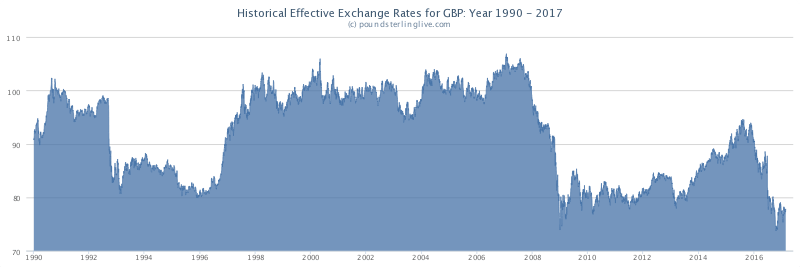
- Pound to Euro exchange rate (Feb 23, 2017): 1.1781
- Pound to Dollar exchange rate: 1.2437
- Pound to Australian Dollar exchange rate: 1.6166
- Pound to New Zealand Dollar exchange rate: 1.7263
The US, Australian and New Zealand Dollars are meanwhile considered to be rich by historical standards while the Euro is considered close to fair value.
An initial default assumption made by a reader of such a report would be that the UK currency is a bargain as it should ultimately recover to fairer valuations, paricularly against those currencies deemed overpriced.
However, a slowing UK economy in 2017 will ensure no substantial and sustainable recovery occurs over coming months argue the authors of the report.
Richard Falkenhäll, Senior FX Strategist at SEB, says the Pound’s undervaluation will only be overcome in the long-term and Britain's decision to leave the EU is still likely to slow growth, albeit subject to a time lag.
Patience for those wanting and expecting a stronger Pound is therefore warranted.
"From a long-term perspective, the GBP is substantially undervalued against most other currencies. Our own long-term fair value estimate suggesting by around 20%. In other words. most of Sterling's depreciation since the British government announced plans in late 2015 to hold a referendum the following year on whether the UK should continue to remain a member of the EU should disappear in the very long-term," says Falkenhäll.
The Pound: An Undervalued Currency
The trade-weighted Pound is one of the world’s most undervalued currencies when viewed from Long-Term Fair-Value (LTFV) estimates conducted by SEB.The bank estimates it to be underpriced in the region of about 20%.
As we can see below, the Pound is valued at incredibly low levels by historical standards.

“Most of Sterling's depreciation should disappear in the very long term,” says Falkenhäll.
In trade-weighted terms the Euro meanwhile lies fairly close to its LTFV, being only slightly overvalued today.
By contrast SEB cite the trade weighted terms the USD is presently one of the most overvalued G10 currencies
New Zealand and Australian Dollars as meanwhile two of the world’s most overpriced currencies.
“At present, the commodity currencies are more overvalued than any of their G10 counterparts at 15% in trade weighted terms, almost as much as they were a couple of years ago before they corrected substantially lower due to weaker commodity prices and rate cuts from the central banks.
Partly, their past year’s recovery probably reflects such fundamentals as above average growth and rising commodity prices, but also the attractive yield offered by the AUD and NZD compared to most other currencies has contributed.
“Although both are still substantially overvalued, they are less so than a few years ago. Eventually they will correct lower against virtually all other G10 counterparts, but probably not just yet,” says Falkenhäll.
Pound Sterling to Struggle this Year
Despite the Pound offering very good value, investors should sit back and wait for it to become even cheaper in coming months as Falkenhäll reckons a slowing economy will ensure the currency struggles over coming months.Indeed, the call comes the on the same day the ONS reports that business investment has fallen in their latest GDP data series while other big-name analysts forecast a notable slow-down in the economy.
“We are negative on the UK economy going forward although it did well in H2 last year. In particular household and capital spending seem vulnerable from the impact of growing political uncertainty created by the upcoming divorce from the EU,” says Falkenhäll.
Retail sales released in January have showed signs of slowing and will likely continue to do so as consumers tighten purse strings largely as a result of rising inflation.
Furthermore, investment spending by businesses in 2017 is expected to contract.
"The UK appears to be moving towards a hard Brexit, a situation that is likely to adversely affect the country's trade relationships with the EU, which remains Britain's most important export market, accounting for a 44% share in 2016. To make matterss even worse, political uncertainty may reduce capital spending," says Falkenhäll.
The slow reaction function of the economy - i.e it is only now starting to slowdown following the Brexit vote has Falkenhäll believing that, "Sterling's current valuation is probably not yet so extreme as to prevent its potential further depreciation".
That is to not say some further gains cannot be eked out by Sterling in the short-term as SEB’s cited reasons for GBP weakness are currently overshadowed by political risks elsewhere, which have caused a small recovery of the GBP.
“We argue this recovery is just temporary and is unlikely to last,” says Falkenhäll. The recovery in the Pound is not so much because things have improved in any particular way in the UK but more because political uncertainty and risks have increased elsewhere.
0 comments:
Post a Comment